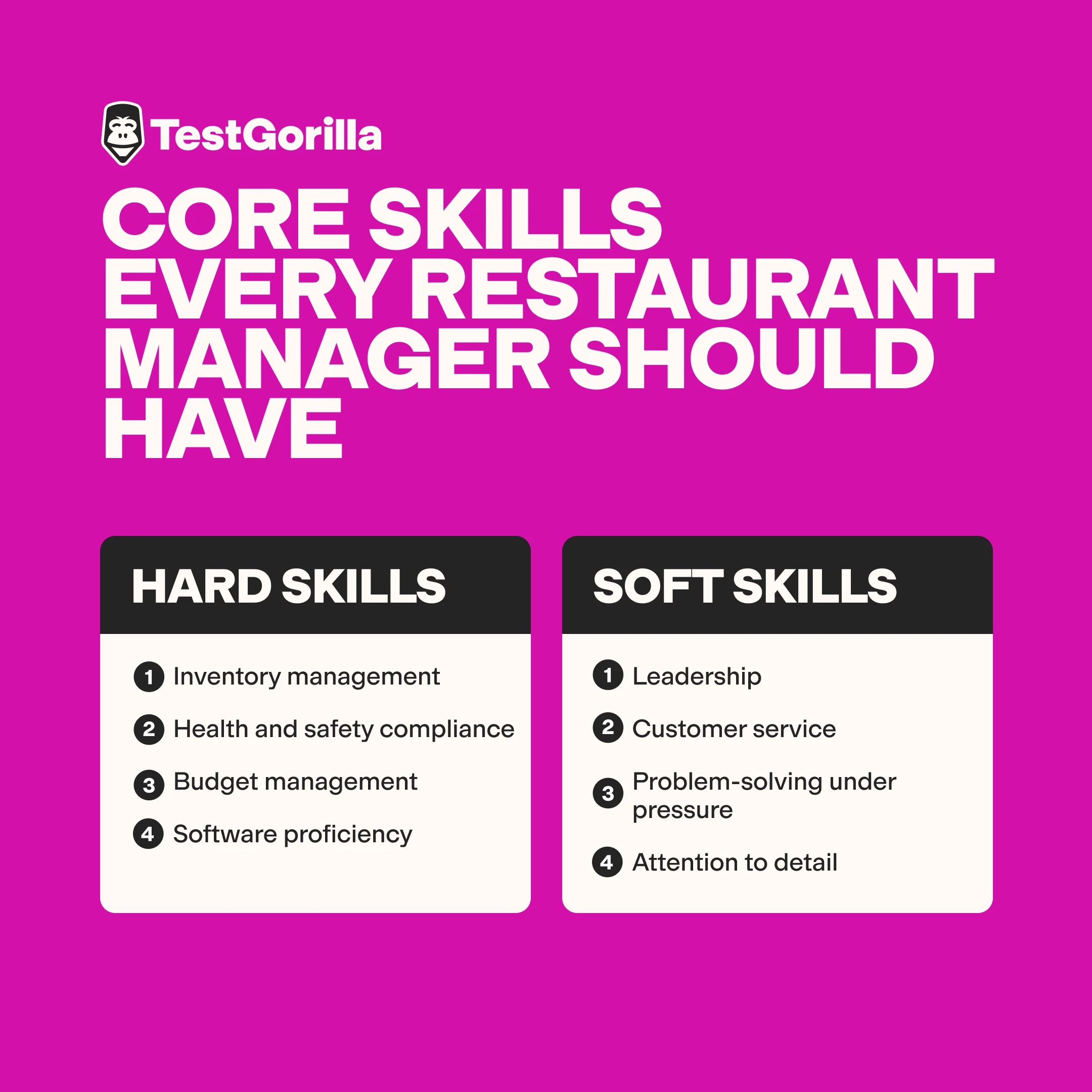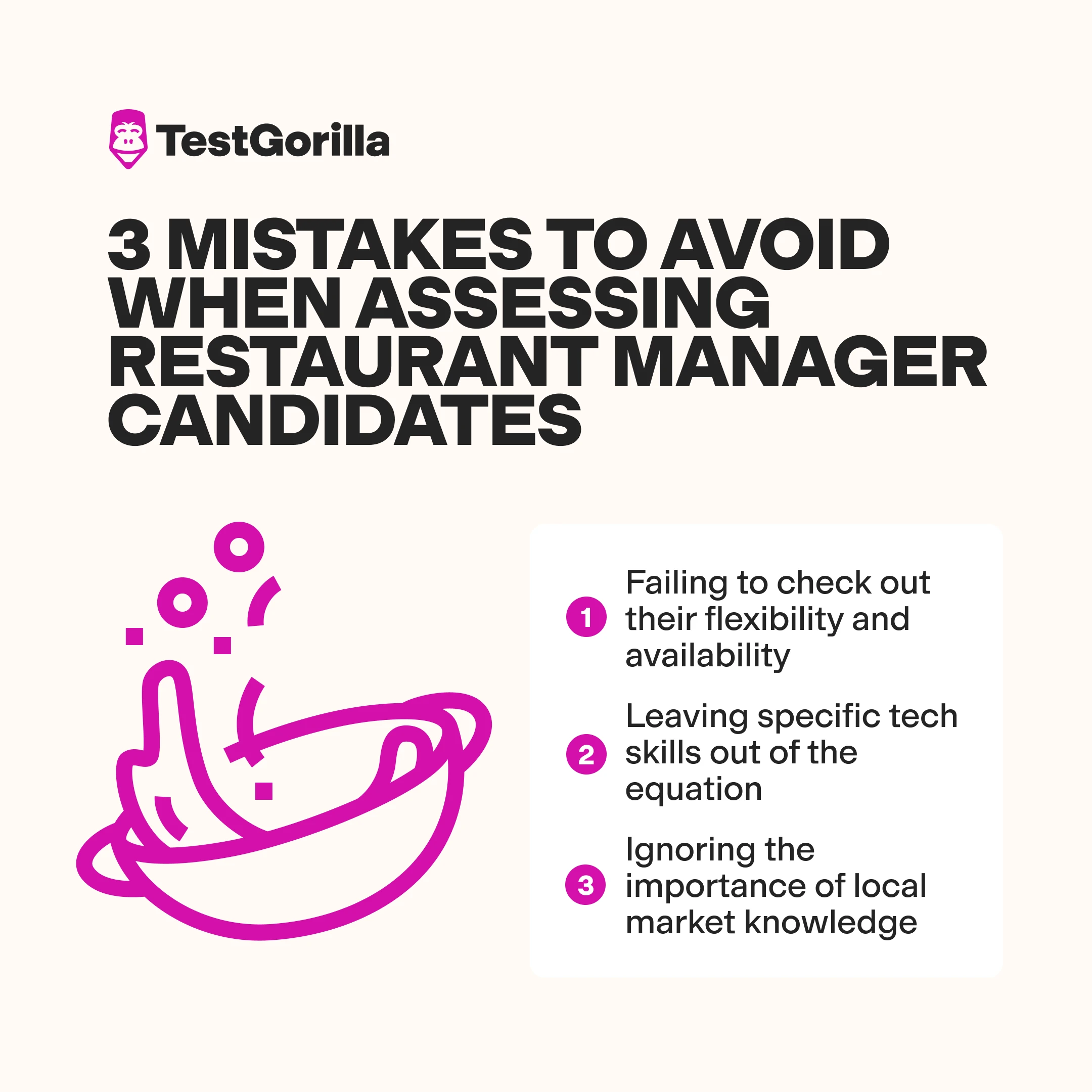Restaurant managers oversee nearly every aspect of your business. They run operations, manage and hire restaurant staff, handle crises, and keep customers happy. It’s pretty tough.
You know what else is tough? Finding a good restaurant manager.
With a broad role like this, it’s tricky to know which skills to look for and how to assess them. Get it right, and you can expect a thriving business. But if you miss the mark, things can go south pretty fast.
Luckily, we're here to help. Below, we discuss eight essential skills to look for in restaurant managers – and show you how to assess your restaurant manager candidates properly.
What is a restaurant manager?
A restaurant manager handles the day-to-day operations of a restaurant. They oversee staff, manage resources, and keep customers happy.
Restaurant managers often perform a wide range of tasks. Here are some of their daily duties.
Working closely with chefs to discuss menu items and kitchen needs.
Checking inventory and placing orders for supplies.
Overseeing the dining area, checking that service runs smoothly, and making sure customers are happy.
Handling shift schedules to make sure the restaurant has enough staff.
Training and showing the ropes to new employees
Resolving all sorts of conflicts – from staff clashes to customer complaints.
Collaborating with everyone from the head chef, kitchen staff, and servers to suppliers and – sometimes – restaurant owners.
Overall, you can rely on good restaurant managers to run your business, even when you’re not looking. They’re crucial in improving efficiency, saving costs, and providing exceptional customer experience.
Core skills every restaurant manager should have
Candidates with the hard and soft skills listed below are most likely to excel in your restaurant manager role.
Hard skills and technical know-how
Inventory management: Keeping shelves properly stocked is a crucial part of the job. With good inventory management skills, restaurant managers can help avoid waste, control costs, and ensure there are always enough ingredients on hand.
Health and safety compliance: Staying on top of health codes isn’t optional – it’s a legal must. The best restaurant managers will know every food safety and hygiene rule. Plus, they’ll stay connected with local authorities to avoid legal troubles and provide a safe dining experience for your guests.
Budget management: Look for restaurant managers who are experienced in budgeting, forecasting, and reporting to keep your restaurant’s financial health in tip-top shape.
Software proficiency: Restaurant managers who are well-versed in point-of-sale systems (POS), reservation and table management apps, and staff scheduling tools can help streamline tasks, save time, and reduce mistakes. This way, they can spend more time overseeing live operations and tending to customers.
Soft skills and traits
Leadership: Great restaurant managers don't just manage – they lead. A skilled restaurant manager can inspire and motivate staff to achieve common goals, help the team get through the stormiest shifts, and make every employee feel valued.
Customer service: Dana Spiotta, author, and restaurateur, shared, “Although a great restaurant experience must include great food, a bad restaurant experience can be achieved through bad service alone.” Find candidates who go the extra mile for guest satisfaction, handle service hiccups with grace, and encourage customers to come back.
Problem-solving under pressure: When the heat is on, a cool head solves the problem. Whether they’re dealing with a delayed order, a staffing issue, or a customer complaint, a good restaurant manager can think on their feet, find effective solutions, and keep things moving.
Attention to detail: When it comes to good restaurants, the devil is in the details. Applicants with an eye for detail can help maintain high standards in food presentation, cleanliness, and service to ensure a top-notch dining experience.
Want to hire for other food and beverage roles?
Check out our guides to writing a head chef job description, hospitality manager job description, and server job description. We detail the key skills for these jobs and provide you with a job description template to get started.
The best insights on HR and recruitment, delivered to your inbox.
Biweekly updates. No spam. Unsubscribe any time.
How to assess restaurant manager candidates
Resumes list candidates’ skills and past experiences. But how can you use a candidate’s resume to check if they truly have the skills and knowledge you need? The answer: you can’t.
The best way to assess applicants is through talent assessments with a platform like TestGorilla.
You can choose from 400 tests – including tests on job-specific skills, personality traits, cognitive abilities, and more – to get a good understanding of your candidate’s strengths and abilities before hiring them. This process is quick, and it helps you make fair hiring decisions rooted in hard data.
Combine up to five of the below tests to create a talent assessment that’s unique to your restaurant manager position. You can even add your own custom questions.
Here’s how you can use TestGorilla to find the best restaurant manager.
Evaluate your candidates’ hard skills
Consider these job-specific tests to learn more about your applicants’ technical skills:
Our Restaurant Management test is an excellent one-stop shop to assess candidates’ operational skills, food and safety standards, financial management, and staff management abilities.
The Business Operations Management test lets you see how applicants plan, organize, and control your restaurant’s operations, inventory, and supply chain.
TestGorilla’s Budgeting test gives you a glimpse into how candidates can estimate, monitor, and control your restaurant’s expenses.
Look for these soft skills
In addition to testing their hard skills, test your candidates for some softer skills they need to connect with customers, staff members, food critics, and others. Here are some tests you might use:
The Attention to Detail (Visual) test is a great tool to see if candidates can pay close attention to visual cues and quickly spot and fix any mistakes.
With our Leadership and People Management test, you can instantly judge if a candidate has what it takes to both guide and influence your restaurant staff.
Use the Problem Solving test to assess how applicants lean into and provide quick and effective solutions for problems – a crucial part of any restaurant manager’s job.
Put candidates through our Enneagram, 16 Personalities, DISC, or other personality tests to look for adaptability, resilience, motivation, and other traits that will help them meet the role’s demands.
Don’t forget to check for culture add
Candidates who don’t vibe with your culture won’t work out in the long run, no matter how skilled they are. Consider this test to be extra sure you’re hiring someone who’ll match your company’s energy and values:
Our Culture Add test lets you rank values and attributes that are most important to your company – for instance, diligence, helpfulness, and so on. Candidates complete the same test so you can see what matters most to them and hire candidates who’ll not only match but also contribute to your restaurant’s culture.
Seal the deal with behavioral interviews
Behavioral interviews are perfect in digging deeper into your candidates’ skills and experiences, getting a sense of who they really are, and learning more about how they deal with real-world situations.
Try asking questions like:
"Can you tell me about a time when you had to handle a difficult customer situation? What steps did you take, and what was the outcome?" - This gives you insight into their problem-solving and customer service skills.
"Describe a situation where you had to motivate your team during a particularly busy shift. What strategies did you use, and how did the team respond?" - This helps you understand their leadership style and ability to keep the team energized and focused under pressure.
Want more ideas? Check out our blog post with 36 behavioral interview questions for managers.
3 mistakes to avoid when assessing candidates
When assessing restaurant manager candidates, stay clear of these common pitfalls that could lead to hiring the wrong person for the role.
1. Failing to check out their flexibility and availability
Restaurant staff don’t typically work your standard nine-to-five gig. Their hours can be more demanding. We’re talking late nights, weekends, and even some holidays. HR expert Yashna Wahal told us, ”If you don’t probe into a candidate's willingness or ability to work these hours, you’ll end up in a bind when you need them most.”
2. Leaving specific tech skills out of the equation
Today’s restaurants run on technology. Whether it’s for accepting online reservations or organizing staff schedules, your restaurant manager will need the right amount of tech-savviness to deal with your restaurant’s tech.
Don’t forget to ask candidates which tools they’ve used before or check how they handle your restaurant's systems. Otherwise, you could end up with a manager you’ll need to train from scratch or someone non-tech-savvy who’ll slow things down.
3. Ignoring the importance of local market knowledge
Restaurants aren’t just about what’s cooking. It’s also about who’s coming in through the door. Good restaurant managers must understand local trends and be well-cued into what customers want.
If you don’t evaluate your candidates’ familiarity with the local market, you could hire a restaurant manager who simply can’t attract and impress customers. For example, if a new manager tries to sell high-priced meals in a restaurant popular with college students, they might not get many takers since most students are looking to keep it cheap.
FAQs
Looking for more information? Check out the answers to these frequently asked questions.
What is the daily routine of a restaurant manager?
Every day can be a bit different, and it depends on the business. Usually, a restaurant manager starts off the day by checking the stock levels, catching up with the team, and getting everything ready for when customers start coming in. They're also there to sort out any issues during meal times. They often end their day looking at the finances and planning for the next day.
How much do restaurant managers get paid?
What a restaurant manager earns depends on things like where the restaurant is, what kind of place it is, and how much experience they've got. According to ZipRecruiter, on average, they make about $54,000 a year, which breaks down to around $26 an hour.
Why do restaurant managers quit?
Managing a restaurant can be super stressful because it's such a demanding job. If managers don't love what they do or can’t handle the pace, they can burn out fast. That's why it's key to hire people who are passionate, resilient, and understand what the job entails. Also, you should make sure they get the support and breaks they need to stay happy and not get too stressed.
Struggling to retain talent? Read our guide about how to retain talent with skills-based hiring.
Discover the most skilled restaurant managers with TestGorilla
A good restaurant manager comes with good knowledge of the restaurant industry. But a great restaurant manager brings a unique set of hard and soft skills to the table, shining in everything they do – from running service and scheduling shifts to managing customer complaints, planning finances, and sticking to food safety laws.
With so much at stake, you can’t just scan a resume and hire someone on a whim. You need to see them in action, and our expert-created talent assessments are the best way to do this. Pick from hundreds of tests to check your candidates' real-world skills, traits, and cognitive abilities so you can hire a restaurant manager who ticks all the boxes.
Ready to start hiring? Check out our library of 400 tests, book a live demo with a member of our team, or create a free TestGorilla account today!
You've scrolled this far
Why not try TestGorilla for free, and see what happens when you put skills first.
















